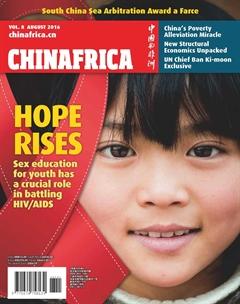Broader Outlook
By Bob Wekesa

From the first session, it was evident that the 27th African Union (AU) Summit convened in Kigali, Rwanda from July 10-18 was different. For starters, as she welcomed the African leaders, AU Commission Chairperson Nkosazana Dlamini-Zuma was simultaneously being bid farewell with a series of recognition awards for her four-year stint. Thus, the summit was undergirded by the campaigns for the top post that usually mark leadership transitions.
New African passport
Dlamini-Zuma said, “In our years of service to the AU member states, we worked tirelessly to ensure that we leave institutions more effective than we found them.”One of her final acts was to symbolically hand over a pan-African electronic passport to both the host, Rwandan President Paul Kagame, and Chadian President Idriss Deby, who is also the AU chairperson.
In the interests of integration, the AU has pressed ahead with its e-passport, set to revolutionize movement across the continent. The e-passport, to be rolled out to all Africans within three years, is ultimately expected to allow visa-free access to all 54 AU member states and also facilitate the movement of goods and services.
It sets the continent on an integration path, encouraging and facilitating intra-Africa movement and with it, increased intra-Africa trade that will go a long way to boosting socio-economic development. A common passport and a common trading market have long been a focal point of the AUs development blueprint Agenda 2063.
What remains to be seen is the acceptability of the e-passport as a travel document across the continent as well as its implementation, which could be a complex task, given issues like the large number of stateless Africans.
Security concerns
Another urgent matter that made it to the summit agenda was the outbreak of violence in South Sudan, threatening a reversion to civil war less than three months after the establishment of a national unity government that brought together President Salva Kiir and his antagonist, First Vice President Riek Machar.
The Intergovernmental Authority on Development (IGAD) has been mandated to initiate a peaceful resolution to the recent turn of events, in which over 300 people have died. In seeking ways to address the South Sudan problem, the AU and IGAD will likely listen to the voices of countries such as China, which have not only peacekeeping forces on the ground but have also played a leading role in bringing the combatants to the negotiating table.
Any AU summit is like a conference with mini conferences under one roof. From the endorsement of AIDS Watch Africa, an initiative aimed at eradicating AIDS, tuberculosis and malaria by 2030, to discussing the launch of a free trade zone in Africa and the AUs thematic focus on human rights, many decisions were reached.
One of those decisions was adopting a new blueprint to eliminate the scourge of malaria across Africa by 2030. The African Leaders Malaria Alliance said mortality rates in Africa have fallen by 66 percent among all age groups since 2000 and by 71 percent among children under five years. However, malaria still remains the primary cause of morbidity and child deaths on the continent.
Creative funding
The AU is beginning to not just make promises but to keep promises. Enhancing internal African financing of African projects was, for instance, a major point of strategizing. This move toward meeting African budgetary needs from homegrown sources stands in contrast to the continents over-reliance on external funding.
Future funding will be generated from an approved levy on all eligible goods at a rate of 0.2 percent. Rwandan Finance Minister Claver Gatete said this will mean revenue of $1.2 billion annually for the AU coffers, almost three times the previous budget allocation for 2015-16.
The new financing strategy is prompted by the fact that half the time the AU is short of funds. When deciding on internal financial sources for African projects and programs, especially peace and security with African conflicts escalating out of control, African countries have to await support from external donors.
If the strategy is implemented, they can pool resources internally to finance initiatives such as standby peacekeeping missions that can be deployed to conflict flashpoints like Somalia and South Sudan. The increased budget will fund 25 percent of Africas peace missions and 75 percent of other AU programs, Gatete said.
Industrialization push
A major cross-cutting issue was industrialization. Based on research and a policy drive by the New Partnership for Africas Development, the AU think tank, AU leaders made fresh commitments for “collaboration in promoting industrialization on the continent.” Africa has the requisite factors that can propel it into a global industrial hub, notably mineral resources as a well as a young population that is both a labor force and a market for finished products.
The industrialization drive is a major component of Agenda 2063. Senegalese President Macky Sall spoke about utilizing Africas rich natural and human resources as well as tapping technological advancements to enhance the continents development.
The elevation of industrialization in the master plan fits in well with China-Africa engagements. The essence of Chinas involvement in Africas industrialization is the Forum on China-Africa Cooperation (FOCAC) Action Plan. At the FOCAC Summit in Johannesburg last year, the China-Africa partnership elevated industrialization, with China pledging to support Africa in various technological and financial ways to build up the continents industrialization capacity.
The summit closed with the heads of state issuing a joint statement in line with the theme, 2016: African Year of Human Rights with Particular Focus on the Rights of Women. It recommended respect for human rights, encouraging gender equality, promoting female empowerment, and pursuing sustainable development.

